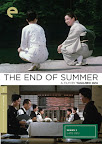
This is my first encounter with Ozu. In fact this is my first encounter with any other Japanese cinema other than Samurai movies (and of course Rashomon, I don't like it to be tagged as Samurai movie). And Samurai movies are always little overwhelmingly active. So when I read in the leaflet that its a family drama, I didn't know what to expect. So I started watching in a free mind.
The story is simple. Manbei, the widowed father has a small sake company in Osaka. He has three daughters, widowed elder daughter Akiko, married second daughter Fumiko and yougest daughter Noriko. Fumiko's husband Hisao now runs the sake shop for his father in law. The movie opens with Manbei's brother bringing a marriage proposal for Akiko. As we go along we find there is a proposal for Norika, too. The family starts discussing over the proposals, whether Akiko is ready to marry again, whether Noriko would like to marry the wealthy guy they have selected, because that will save their business. Meanwhile there is something worng with the father, Manbei; he is spending a lot of time outside. Finally everyone finds out that he has met his old flame Tsune, who now resides at Kyoto, and their old affair is burning again. With this discovery the family gets disturbed. Fumiko tries to intimidate her father. Then one day after a family reunion at Kyoto, Manbei gets ill - a stroke, may be. The family gets concerned. Fumiko feels guilty, may be her taunts about father's affair was too hard on him. As Manbei recovers, we see the eldest and the youngest daughters, Akiko and Noriko discussing over the proposals, what should be good for them, for the family, for everyone; should they marry the persons or not. Then one day when Manbei has almost completely recovered, he sneaks out of the house to meet Tsune. That evening he has another attack, and dies at Tsune's. Everyone gets together again. But now its for the funeral of the cheerful old man who lived his life to the fullest. The movie ends as the family goes to the crematory.
A simple story, no dramatization. A simple narration. It reminded me of Satyajit Ray's style of story telling. Especially of 'Kanchenjungha'. Similar family story, similar kind of tension between generations. Sequences of Akiko and Noriko's discussion about their future generates a playful image of the youth. Whereas when Manbei and Tsune are around a tone of nostalgia floats over. Its a tale of two generations trying to live happy and enjoy the life; and for that reason someone has to refuse a wealthy proposal in spite of dire needs and someone has to go out side the social rules. Thats how life poses a set of choices in front of everyone. And only you can choose you way of enjoying life. The last words of Manbei was "Is that it? Is that all life has got?" Manbei had his share of life. Now its up to Noriko and her sisters to decide how to live theirs.
There is certain kind of warmth that floats around over the whole cinema. Akiko and Noriko discusses bout love and getting older on the riverside; Manbei and Tsune discuss about their first moonlight adventure of life; Manbei and his grandson play hide-and-seek; Fumiko makes whole hearted confessions at the reunion dinner ... all is so homely, so warm. There is nothing special about it; and that is what it is special about! It feels like story of our own lives, lives of common people.
The narrative is very fluent, simple and homely. Not a single event of dramatization. Its so natural. The transitions are very natural. Ozu uses some still shots of objects as a transition - objects of their daily life. A lot of shots are shot in a low angle as if viewed from eyes of someone, who is sitting on the floor. It gives a new perspective, as if the audience become a part of the family. I don't know anything about Japanese families but I never felt out of place while watching it. Thats what a master film maker does, he makes you involved in his way of life!

No comments:
Post a Comment